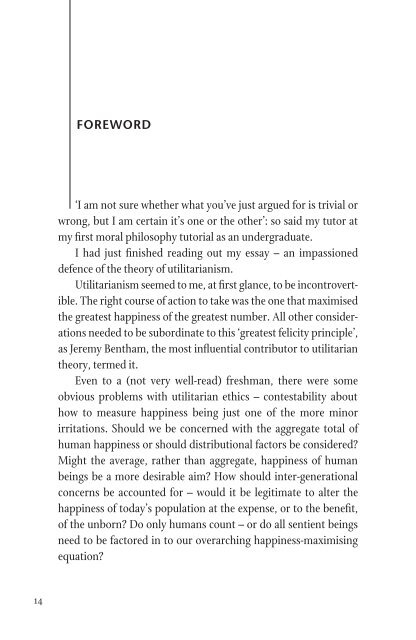… and the Pursuit of Happiness - Institute of Economic Affairs
… and the Pursuit of Happiness - Institute of Economic Affairs
… and the Pursuit of Happiness - Institute of Economic Affairs
Create successful ePaper yourself
Turn your PDF publications into a flip-book with our unique Google optimized e-Paper software.
foreword<br />
Foreword<br />
‘I am not sure whe<strong>the</strong>r what you’ve just argued for is trivial or<br />
wrong, but I am certain it’s one or <strong>the</strong> o<strong>the</strong>r’: so said my tutor at<br />
my first moral philosophy tutorial as an undergraduate.<br />
I had just finished reading out my essay – an impassioned<br />
defence <strong>of</strong> <strong>the</strong> <strong>the</strong>ory <strong>of</strong> utilitarianism.<br />
Utilitarianism seemed to me, at first glance, to be incontrovertible.<br />
The right course <strong>of</strong> action to take was <strong>the</strong> one that maximised<br />
<strong>the</strong> greatest happiness <strong>of</strong> <strong>the</strong> greatest number. All o<strong>the</strong>r considerations<br />
needed to be subordinate to this ‘greatest felicity principle’,<br />
as Jeremy Bentham, <strong>the</strong> most influential contributor to utilitarian<br />
<strong>the</strong>ory, termed it.<br />
Even to a (not very well-read) freshman, <strong>the</strong>re were some<br />
obvious problems with utilitarian ethics – contestability about<br />
how to measure happiness being just one <strong>of</strong> <strong>the</strong> more minor<br />
irritations. Should we be concerned with <strong>the</strong> aggregate total <strong>of</strong><br />
human happiness or should distributional factors be considered?<br />
Might <strong>the</strong> average, ra<strong>the</strong>r than aggregate, happiness <strong>of</strong> human<br />
beings be a more desirable aim? How should inter-generational<br />
concerns be accounted for – would it be legitimate to alter <strong>the</strong><br />
happiness <strong>of</strong> today’s population at <strong>the</strong> expense, or to <strong>the</strong> benefit,<br />
<strong>of</strong> <strong>the</strong> unborn? Do only humans count – or do all sentient beings<br />
need to be factored in to our overarching happiness-maximising<br />
equation?<br />
For a few days at least, however, <strong>the</strong>se seemed to be mere<br />
nuances <strong>of</strong> possible disagreement within a highly attractive<br />
universal ethical <strong>the</strong>ory. If human happiness was not to be <strong>the</strong> key<br />
guide to our decision-making, what would?<br />
Fortunately, not many weeks passed before I was introduced<br />
to <strong>the</strong> work <strong>of</strong> John Rawls <strong>and</strong> Robert Nozick, who both contributed<br />
to clarifying <strong>the</strong> morally counter-intuitive nature <strong>of</strong> utilitarianism<br />
<strong>and</strong> establishing a more liberal, individualistic framework<br />
for political <strong>the</strong>ory.<br />
Nozick’s discussion <strong>of</strong> an experience machine is perhaps <strong>the</strong><br />
most keenly analysed <strong>and</strong> contested section <strong>of</strong> his work. In short,<br />
he asks us to consider <strong>the</strong> hypo<strong>the</strong>tical opportunity <strong>of</strong> plugging<br />
ourselves into some form <strong>of</strong> device which would generate <strong>the</strong><br />
sensations <strong>of</strong> a life happier than <strong>the</strong> one we would o<strong>the</strong>rwise lead.<br />
We would experience greater levels <strong>of</strong> ecstasy <strong>and</strong> fewer feelings <strong>of</strong><br />
pain if we would just strap ourselves into this ‘orgasmatron’ <strong>and</strong><br />
flick on <strong>the</strong> switch.<br />
Not only would we recoil at actually forcing our fellow citizens<br />
into such machines, we would also choose not to take up <strong>the</strong><br />
entirely voluntary option ourselves. We would, without hesitation,<br />
plump for <strong>the</strong> less happy but more individualistic path. We<br />
would most likely consider anyone deciding to enter <strong>the</strong> machine<br />
<strong>the</strong>mselves as committing some form <strong>of</strong> suicide. <strong>Happiness</strong> is not<br />
something we simply want to experience; it’s something we want<br />
to achieve.<br />
But if utilitarianism has been tackled successfully in <strong>the</strong> sphere<br />
<strong>of</strong> moral philosophy, it threatens to make a re-emergence in <strong>the</strong><br />
field <strong>of</strong> economics.<br />
‘Wellbeing’ or ‘happiness’ economics purports to show<br />
that traditional measures <strong>of</strong> economic ‘success’ – such as gross<br />
14<br />
15












